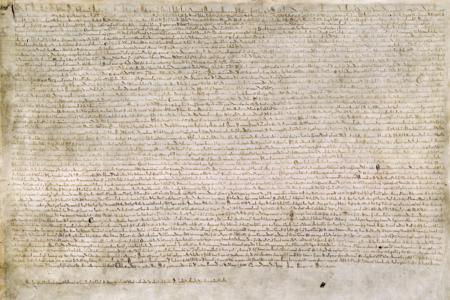Happy birthday to the rule of law
Monday, June 15, is the 800th birthday of Magna Carta, the "Great Charter" which inaugurated government limited by the rule of law. When King John affixed his seal to the parchment, however unwillingly, he was acknowledging that he could no longer tax and punish and rule at will.
No wonder that it was an inspiration to our ancestors at the time of the American Revolution. As our Massachusetts Constitution would recognize in 1780, our government was to be "a government of laws, and not of men." Magna Carta marks the beginning of our written constitutional tradition.
King John was an awful ruler. He governed haphazardly, often consumed with his own power and an insatiable need to pay for his far-reaching schemes. John frequently tried to force opponents and rivals to pay large sums to his government.
He interfered in religious matters, telling St. Hugh, Bishop of Lincoln, to cut short his Easter sermon, not once but three times, in 1200, because the king wanted to dine. John justified his actions with an appeal to royal authority, which he conceived of in almost unlimited terms. When the barons of England had had enough, they revolted. They took several large towns, and eventually the capital itself.
Under intense pressure, John agreed to a peace treaty of sorts. The document, which came to be known as the "Great Charter," provided that the English Church would be free and that future taxes would be raised only with the "common counsel of the realm," including bishops and barons, an early version of "no taxation without representation." It is a tribute to the righteousness of the barons' cause that the principles they enunciated remain to this day.
The tradition of classical Roman law, which would inspire the continental civil law systems, did not think that the sovereign was limited by law. "The Emperor is not bound by laws," proclaimed Justinian's Digest.
The English tradition was different. As Henry de Bracton wrote later in the 13th century, "The king must not be under man but under God and under the law, because law makes the king, for there is no rex where will rules rather than lex."
As clauses 39 and 40 of the 1215 original version of Magna Carta specified:
"No free man shall be taken or imprisoned or disseised or outlawed or exiled or in any way ruined, nor will we go or send against him, except by the lawful judgment of his peers or by the law of the land. " (The royal we refer to King John.) "To no one will we sell, to no one will we deny or delay right or justice." This last clause, in its Latin original, appeared in the seal of Massachusetts' Supreme Judicial Court in 1785.
The "judgment of one's peers" was the predecessor of trial by jury, and "the law of the land" was the predecessor of our due process. In any case, government could make bad things happen to people not simply because the king so willed, but only according to law and legal process.
Recently, the United States Supreme Court, in the case of Hosanna-Tabor Evangelical Lutheran Church and School v. EEOC, quoted the first clause of Magna Carta on the freedom of the English Church in explaining the reach of the First Amendment's religious freedom clauses. The court decided that religious groups can choose their own teachers and ministers, regardless of what the government says.
Thus, Magna Carta with its rule of law is still alive today, both as law and as symbol: from Watergate to Obamacare, from Deflategate to FIFA.
And what of John?
It's the most popular name for popes (23) and second most popular for presidents of the United States (five).
But England has only one king with his name. His performance is remembered as so poor that no monarch of England has ever named his or her son John. Eight hundred years later, the unwilling signer of Magna Carta is still King John the Only.
DWIGHT G. DUNCAN IS A PROFESSOR OF CONSTITUTIONAL LAW AT UMASS SCHOOL OF LAW DARTMOUTH. HE RECENTLY WROTE A LAW REVIEW ARTICLE ON MAGNA CARTA'S FREEDOM FOR THE ENGLISH CHURCH.
- Dwight G. Duncan is professor at UMass School of Law Dartmouth. He holds degrees in both civil and canon law.



















